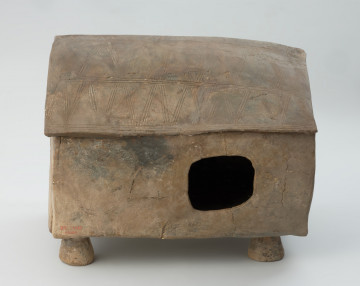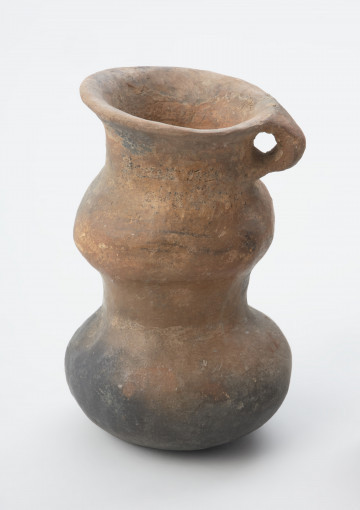
A cottage urn
around 750 p.n.e. — 550 p.n.e.
National Museum in Szczecin
Part of the collection: Bronze Age
This attractive clay urn for cremated human remains has the shape of a small house standing on four pillars, covered with a gabled roof. In one of its longer sides, there is an opening imitating an entrance, and on the edges of the walls, narrow thickenings are imitating the structural elements of a wooden building. From the territory of present-day Poland, there are only a few products of this type known, which are characteristic of one short chronological section - the Hallstatt period C (750-600/550 BC). House urns are limited only to Eastern Pomerania, where a dozen or so specimens have been recorded so far. The vast majority of these are discoveries from before 1945, only a few of which have survived until now. Three such unique artefacts, originating from two Pomeranian localities, are in the collection of the National Museum (Muzeum Narodowe) in Szczecin. The presented urn comes from a cemetery accidentally discovered in 1892 during fieldwork. It was one of five cist graves discovered at that time. Its interior was filled with burnt bones, and there was also a small pin and fragments of a bronze bracelet. At the beginning of 1893, Pastor Benkendorff donated this discovery to the museum collection in Szczecin. At the end of the Second World War, due to repeated Allied air raids, the then director of the museum, Dr Otto Kunkel, ordered the evacuation of a large part of the collection. The urn, like other valuable artefacts, was transported deep into Germany. It did not return to the National Museum in Szczecin until 2009 when it was possible due to the Polish-German exchange of old archaeological collections.
Dorota Kozłowska
Author / creator
Dimensions
the entire object: height: 42 cm, width: 48 cm
Object type
funerary vessel, house-shaped urn
Technique
firin, carving, manual modelling
Material
ceramic
Origin / acquisition method
legal transfer
Creation time / dating
Creation / finding place
Owner
National Museum in Szczecin
Identification number
Location / status

around 750 p.n.e. — 550 p.n.e.
National Museum in Szczecin

around 1100 p.n.e. — 750 p.n.e.
National Museum in Szczecin

around 1000 p.n.e. — 900 p.n.e.
National Museum in Szczecin
DISCOVER this TOPIC
National Museum in Lublin
DISCOVER this PATH
Educational path